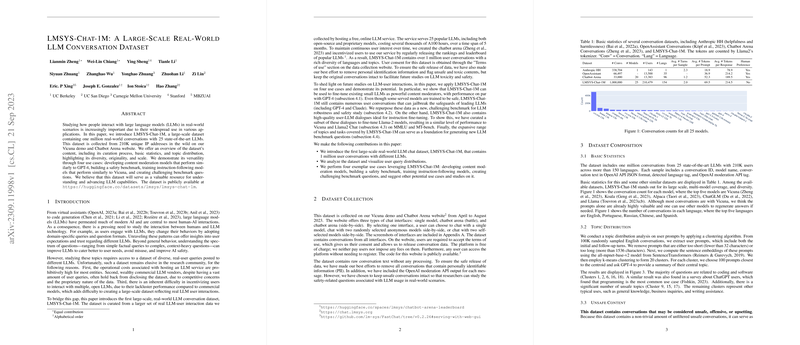Overview of LMSYS-Chat-1M: A Comprehensive LLM Conversation Dataset
The paper presents a substantial contribution to the field of artificial intelligence by introducing the LMSYS-Chat-1M dataset, which encompasses one million real-world conversations with 25 state-of-the-art LLMs. This dataset is of notable significance as it captures authentic interactions from 210,000 users worldwide, detailing how they engage with various LLMs in practical scenarios. The dataset is accessible via the Hugging Face platform and aims to propel research in understanding and advancing LLM capabilities.
The authors provide a wealth of information about the dataset, including its creation, fundamental statistics, and topic distribution. In doing so, the paper highlights the diversity, scale, and novelty of the LMSYS-Chat-1M dataset. Unlike earlier datasets predominantly derived from limited user interactions or proprietary sources, this dataset covers diverse languages and topics, thereby providing a broader spectrum for examining user behavior and LLM performance.
Key Use Cases and Findings
The paper explores four distinct use cases utilizing the LMSYS-Chat-1M dataset, showcasing its versatility:
- Content Moderation Models: The dataset is utilized to develop content moderation models that rival the performance of advanced systems like GPT-4. This demonstrates LLMs' potential in efficiently moderating content at scale, deterring harmful or inappropriate outputs.
- Safety Benchmark Development: By examining conversations that can bypass safety measures (a phenomenon often termed jailbreak), the authors establish a challenging safety benchmark. Notably, the dataset reveals gaps in existing models' safeguards, even for well-regarded systems like GPT-4, thus highlighting areas for improvement in AI safety protocols.
- Instruction-following Model Training: Elements within the dataset are harnessed for training instruction-following models, achieving performance levels similar to open-source models like Vicuna. This underscores the dataset's utility in refining LLMs to better comprehend and execute user instructions.
- Benchmark Question Creation: The dataset serves as the foundation for generating new benchmark questions, exemplified by Arena-Hard-200, which includes complex, real-world task prompts. This helps differentiate open models from proprietary ones by identifying performance gaps in diverse scenarios.
Implications and Future Prospects
The introduction of LMSYS-Chat-1M generates several implications for both practical applications and theoretical research:
- AI Safety: Understanding how users interact with LLMs in authentic environments elucidates vulnerabilities and aids in the development of more robust safety measures.
- Data Privacy and Ethics: The dataset accentuates the importance of adhering to ethical standards and privacy regulations in collecting and utilizing user-contributed content.
- Research Advancement: The dataset will likely catalyze advancements in model fine-tuning, RLHF (Reinforcement Learning from Human Feedback), and other model enhancement strategies, fostering a more nuanced understanding of LLM capabilities and limits.
- Cross-model Comparisons: The dataset's inclusion of multiple LLMs permits comprehensive cross-model evaluations, enabling more informed decisions concerning model deployment based on specific user requirements or environments.
The paper posits this dataset as an invaluable open-source resource for the research community, encouraging further exploration in optimizing LLM functionality and examining AI safety, ethics, and privacy.
Conclusion
In conclusion, LMSYS-Chat-1M emerges as an essential tool in the AI research landscape through its scale, diversity, and availability. As researchers continue to explore and refine AI systems, datasets like LMSYS-Chat-1M offer unique insights into human-LLM interactions, providing a solid foundation for developing safer, more effective, and user-aligned AI systems. Future collaborations and continuous data updates will enhance the dataset's impact, supporting the community's collective efforts to harness LLMs' full potential.
